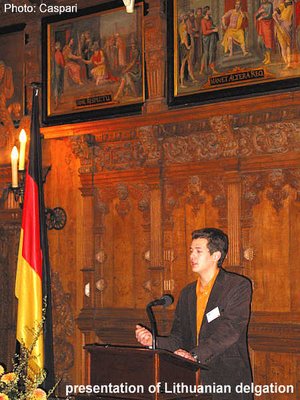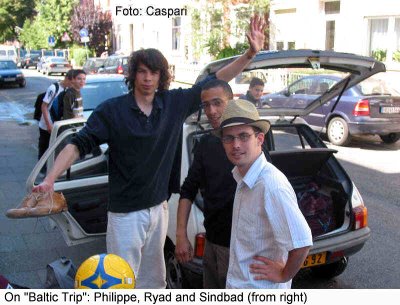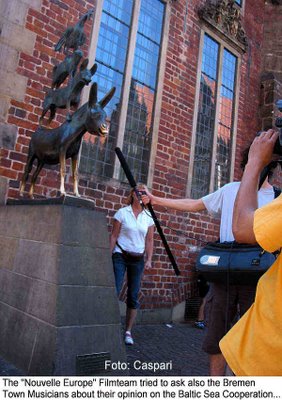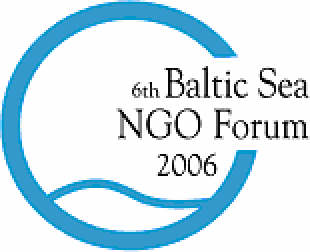The German NGO Initiative Baltic Sea Cooperation, a loose coalition of German NGOs interested in the Baltic Sea Region, held a meeting on Saturday 8th of April in the Town Hall of Rostock.
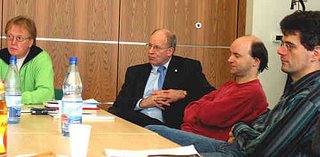 The Initiative works as a link to the Baltic Sea NGO Network, which has organised the annual BALTIC SEA NGO FORUM since 2001. The Baltic Sea NGO Network since then was developed parallel to activities of the Council of Baltic Sea States (CBSS), which was founded in 1992.Roland Methling, Mayor of Rostock Hanseatic Town, welcomed the NGOs in the Rostock Town Hall. Telling about some recent developments in Rostock and at the German Baltic Sea Coast, he expressed his readiness for closer cooperation also in frame of the NGO FORUM. As Rostock Town is f. ex. active in the Union of Baltic Cities (UBC), this could be also a link to the NGO-community.
The Initiative works as a link to the Baltic Sea NGO Network, which has organised the annual BALTIC SEA NGO FORUM since 2001. The Baltic Sea NGO Network since then was developed parallel to activities of the Council of Baltic Sea States (CBSS), which was founded in 1992.Roland Methling, Mayor of Rostock Hanseatic Town, welcomed the NGOs in the Rostock Town Hall. Telling about some recent developments in Rostock and at the German Baltic Sea Coast, he expressed his readiness for closer cooperation also in frame of the NGO FORUM. As Rostock Town is f. ex. active in the Union of Baltic Cities (UBC), this could be also a link to the NGO-community.
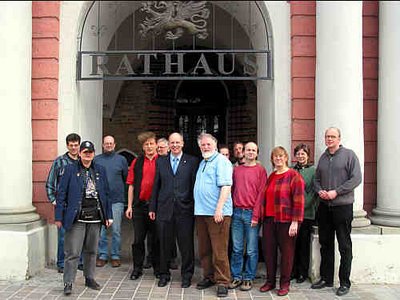 Albert Caspari, the German Focal Point of the Baltic Sea NGO Network (co-ordinator of activities on German side), reported about two preparation meetings for BALTIC SEA NGO FORUM 2006 in Sweden (one held in January 2006 in Copenhagen, one in March/April 2006 in Stockholm).
Albert Caspari, the German Focal Point of the Baltic Sea NGO Network (co-ordinator of activities on German side), reported about two preparation meetings for BALTIC SEA NGO FORUM 2006 in Sweden (one held in January 2006 in Copenhagen, one in March/April 2006 in Stockholm). The NGOs welcomed the proposals for four workshop-topics. Albert Caspari explained, that the Swedish organisers of the upcoming NGO FORUM will try to organise additional opportunities for meetings also for those initiatives, whose key aspects of activity probably will not be served by one of the main workshops.
The detailed programme for the BALTIC SEA NGO FORUM 2006 is still to be prepared by the Consultative Council (the Focal Points of every CBSS state - Norway, Finland, Sweden, Estonia, Latvia, Lithuania, Poland, Denmark, Germany). The NGO FORUM 2006 is going to take place in Stockholm at 5.-7th of October 2006.
The NGOs representatives at the Rostock meeting discussed some actual issues of the Baltic Sea Region, like HELCOM Baltic Sea Action Plan, problems of Atomic Power Use, sustainable use of energy, Oil Transport at Sea, and new NGO-laws in Russia and other Baltic Sea States. Several regional initiatives of Mecklenburg-Vorpommern presented their activities.
A lively discussion on opportunities of democratic participation in decision processes followed. Lutz Huettel and Dr. Burkhard Luber, two participants of the meeting, initiated the formulation of "NGO essentials" - a declaration of most essential rights, which all NGOs of the Baltic Sea Region should be granted in all CBSS-countries. The initiators hope that the text could function like a catalyst for a discussion among NGOs from different Baltic Sea States.
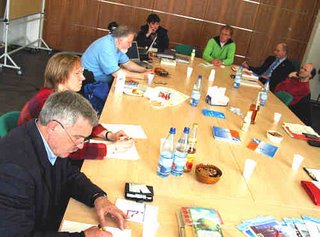 The participants of the NGO-meeting expressed their hope, that the work of the Baltic Sea NGO Networks German Focal Point would be possible to continue, even if no help in financing was available until now. The efforts for co-operation between German NGOs from different Northern German Federal States still has no partner on the Governmental bodies, as the German Federal States do not have a common concept for Baltic Sea Cooperation. The only partner for discussion and exchange of viewpoints until now is an advisor on Baltic Sea Cooperation at the German Federal Foreign Office in Berlin.
The participants of the NGO-meeting expressed their hope, that the work of the Baltic Sea NGO Networks German Focal Point would be possible to continue, even if no help in financing was available until now. The efforts for co-operation between German NGOs from different Northern German Federal States still has no partner on the Governmental bodies, as the German Federal States do not have a common concept for Baltic Sea Cooperation. The only partner for discussion and exchange of viewpoints until now is an advisor on Baltic Sea Cooperation at the German Federal Foreign Office in Berlin.
One project between NGOs in Germany and Poland was presented at a good example of positive results of the BALTIC SEA NGO FORUM in Gdynia / Poland in 2005.
Among the participants of the NGO FORUM 2005 were representatives of Fundacja Slonecznik Pomorskie (Gdansk) and Kulturzentrum Lagerhaus (Bremen). As a result of the NGO FORUM they agreed in starting a project, which aimed in bringing NGOs of both towns together, improving the contacts and starting new projects on various fields of activity.
The Bremen-Gdansk-project could be taken as a "good example" for NGO-cooperation (in contact to GOs), as this project was a direct result of BALTIC SEA NGO FORUM 2005. More information is available (english!) at http://www.hb-gd-ngo-act.de/meeting.html)
Draft paper on "NGO ESSENTIALS" (to be discussed):
Essentials for Regulating the Activities of Non-Governmental Organizations with special reference to state authorities
- All NGOs´ acting falls under the specifications of the Universal Declaration of Human Rights, where especially articles 13 (freedom of movement and residence), 17 (right of property ownership), 19 (freedom of opinion and expression), 20 (right of association), 29+30 (exercising rights and freedoms) are relevant.
- NGO acting must be in conformity with international law regulations which basicly are used by the United Nations and national law regulations of the country in which the NGOs are acting, if it is not in conflict with international principles of human rights.
- The acting of NGOs should not be subjective to more restrictive regulations than those of the penal and civil laws of the country in which the NGO is acting.
- The legal regulations for starting and acting of NGOs should not be repressive, i.e. those regulations should kept on a minimum of procedures.
- Elements of a minimum transparency of NGOs should be: Presenting statutes, informing about changes in the NGO´s responsible board, transparency of finances.
- Conflicts between and NGOs and state authorities have to be submitted to and decided by independent courts with the possibility to appeal against court decisions on the base of the constitution and of the Declaration of Human Rights.
- NGOs, especially those of minorities, should be able to spread their information, news, and commitments by independent media in every language they like without discrimination by governmental authorities.
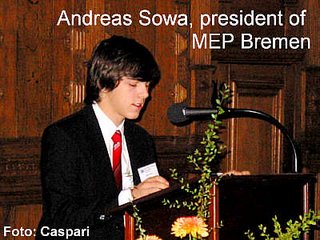 Welcome adresses were given by Willi Lemke, Senator for education and science, and by Helga Trüpel, member of European Parliament.
Welcome adresses were given by Willi Lemke, Senator for education and science, and by Helga Trüpel, member of European Parliament.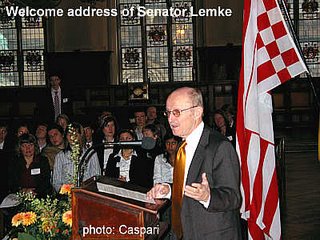 addressing high level international issues among high-school students in the eight countries around the Baltic Sea and other guest nations. The simulation of the European Parliament is used as a model for international sessions (General Assembly) in which young adults from the participating countries take part. The programme might serve as practice for future leaders and politicians.
addressing high level international issues among high-school students in the eight countries around the Baltic Sea and other guest nations. The simulation of the European Parliament is used as a model for international sessions (General Assembly) in which young adults from the participating countries take part. The programme might serve as practice for future leaders and politicians.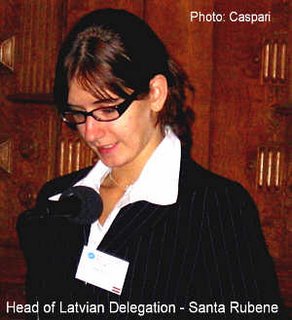 3) Environment, Public health and Food safety (main topic: prevention of infetious diseases)
3) Environment, Public health and Food safety (main topic: prevention of infetious diseases)
